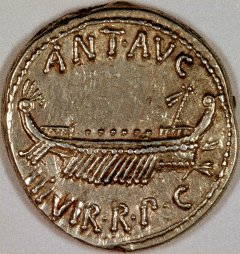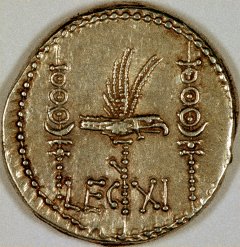| The Very Highest Quality Roman Portraits... |
| Portrait Gallery of Roman Emperors |

| |
|
| |

| |
|
| |
Origins...
Marcus Antonius (better known as Mark Antony) was born in Rome in about 83BC. His father, Marcus Antonius Senior, was a rather disreputable, immoral character who suited his nickname 'Creticus' meaning 'man of clay', i.e. no substance! Hence, the modern insult, 'He's a cretin!' His father died prematurely, leaving him and his brothers, Lucius and Gaius, in the care of his mother. Antony spent a dissolute youth roaming through Rome with his brothers and friends, getting into trouble and having numerous affairs! After this irresponsible phase, Antony went to Greece to study rhetoric. During this visit, he joined the cavalry in the Roman legions of the proconsul Aulus Gabinius en route to Syria where he showed his flair as a cavalry commander and distinguished himself with bravery and courage. It was during this campaign that he first visited Egypt and Alexandria, meeting for the first time a 13-year old princess called Cleopatra...
Rise to Prominence
In 54BC, Antony joined the staff of Julius Caesar's armies in Gaul. He became an ardent Caesarian supporter and he dedicated his year as tribune in 50 BC to further his cause. Caesar wished to be re-elected as consul but a jealous Senate tried to undermine his efforts. Antony left Rome, joining Caesar, who had led his armies to the banks of the Rubicon, the river that marked the southern border of his proconsular authority. Caesar led his armies across the river into Italy and marched on Rome, starting the last Republican civil war. During the war, Antony was Caesar's second in command and served as a loyal and competent commander. When Caesar became dictator, Antony was made Master of the Horse, the dictator's lieutenant. He remained in Italy as administrator in 47BC while Caesar was fighting the last of his enemies in the African provinces. However, Antony's administrative skills were a disaster. Political conflict soon arose and Antony turned to violence. Hundreds of citizens were killed and Caesar had to rush back home to restore order. The dictator withdrew all Antony's political powers and responsibilities and the two men did not see each other for two years. Reconciliation came in January 44BC when Antony was chosen as partner for Caesar's fifth consulship. On March 15 later that year Caesar was assassinated by a group of senators led by Gaius Cassius Longinus and Marcus Junius Brutus. Antony made some attempts at discussing a truce with the assassins and seemed to be pursuing an end to the political tension. However, on the day of Caesar's funeral, he rounded on the assassins, accusing them of cold-blooded murder and anarchy. Showing a brilliant talent for rhetoric and drama, Antony snatched the toga from Caesar's body to show the crowd the scars from his wounds. That night, the Roman citizens went berserk, attacking the assassins' houses and forcing them to flee for their lives.
The Second Triumvirate
The death of Caesar had left a power vacuum in Rome. Octavian, Caesar's great nephew and adopted son, emerged on the political scene. As heir of Caesar's name and estate, he had great political potential due to the esteem of the people and the loyalty of the legions. He was also very willing to fight for power with the other two main contestants: Antony himself and Lepidus. After a few months of difficult negotiations, the three men agreed to share power as the Second Triumvirate. The Triumvirs (literally 'three men') for the Organization of the People were granted sweeping powers for a period of five years. To cement the alliance, Octavian married Clodia, Antony's stepdaughter. The three men then set out to destroy the assassins and anyone else who criticised the triumvirs. The most famous victim of this awful period was Cicero who was murdered as he tried to flee. After the two battles at Philippi in Greece and the suicides of Brutus and Cassius, no one else would stand in the way of the Triumvirate. With the political and military situations dealt with, the Roman world was divided amongst the three men. Lepidus took control of the western provinces and Octavian remained in Italy with the responsibility of securing lands for the veteran soldiers. Antony took the rich Eastern provinces where he prepared to invade the Parthian Empire. During this trip, he met Cleopatra VII of Egypt in Tarsus in 41BC and became her lover, eventually fathering four children.
Political Breakdown and War
Meanwhile, Octavian was not happy in Italy. He divorced Clodia saying that she annoyed him! Fulvia, Antony's wife, led a revolt against Octavian, fearing for her husband's position in Italy. The revolt collapsed in the winter of 41-40BC when Fulvia was besieged in Perusia and forced into surrender by starvation. She was exiled and died shortly after. Antony returned to Rome, negotiated a truce with Octavian and married Octavia, Octavian's sister. This peace, known as the Treaty of Brundisium, reinforced the triumvirate and allowed Antony to finally prepare his long awaited campaign against the Parthians. Antony sailed to Greece with his new wife but the trust between the two men was irreparably damaged. The triumvirate was renewed for another five years in 38BC but Antony left his pregnant wife in Athens and sailed to Alexandria. Cleopatra loaned him the money which he needed for his expedition to Parthia but the campaign proved a disaster. After a series of defeats in battle, Antony lost most of his Egyptian army during a retreat through Armenia in severe winter weather. Meanwhile in Rome, the triumvirate was ended as Lepidus was forced to resign after an ill-judged political move. Now in sole power, Octavian was occupied in wooing the traditional Republican aristocracy to his side. He started to attack Antony's morals and ambition in order to take the moral high ground. Antony was accused of becoming 'un-Roman' and oriental, an unforgivable crime to the proud Romans. The last straw for Octavian was the so-called 'Donations of Alexandria'. Accompanied by Cleopatra, Antony distributed kingdoms and provinces within the Empire between his and Cleopatra's children. Most important of all, Caesarion (Cleopatra's son by Caesar) was declared the legitimate son and heir of Julius Caesar. These proclamations caused a fatal breach in Antony's relations with Octavian and Rome.
The Final Act
Octavian's birthright had been attacked and he was furious. The triumvirate expired on the last day of 33BC and was not renewed. Another civil war was beginning. During 32BC a propaganda war was fought in the political arena of Rome, with accusations flying between sides and later the same year, both consuls and a third of the Senate abandoned Rome to meet Antony and Cleopatra in Greece. In 31BC, the war started when Octavian's admiral, Agrippa, captured the Greek city and naval port of Methone. The enormous popularity of Octavian with the legions secured the defection of the provinces of Cyrenaica and Greece to his side. On September 2, the naval battle of Actium took place. Antony and Cleopatra's navy was destroyed and they were forced to escape to Egypt. Octavian invaded Egypt in August 30BC, intent on crushing his enemies. With nothing left to live for and in total disgrace, Antony committed suicide by falling on his sword. A few days later, Cleopatra killed herself. Octavian was now the master of the Roman world.
Featured Coin
The photo shows a denarius of Antony, minted at the winter quarters of Patraea in Egypt (32-31BC). The obverse shows a war galley with the title of triumvir (III VIR) underneath. Antony was proud of the title and used it despite the triumvirate having expired in 33BC. The reverse shows the Eagle between two legionary standards and the title of the Eleventh Legion (LEG XI), issued shortly before the naval Battle of Actium in 31 BC, at which he lost to Octavian, and committed suicide.
Roman Emperors Portrait Gallery
You may wish to visit our portrait gallery of Roman emperors. Although it is not complete, we add new and better coins when we can. We are always keen to buy superior quality Roman coins to upgrade our photo gallery.
If you want to find the value of a coin you own, please take a look at our page I've Found An Old Coin, What's It Worth?
| ...at the Lowest Possible Price |
|
32 - 36 Harrowside, Blackpool, Lancashire, FY4 1RJ, England. Telephone (44) - (0) 1253 - 343081 ; Fax 408058; E-mail: info@chards.co.uk The URL for our main page is: https://24carat.co.uk Chard(1964) Ltd |